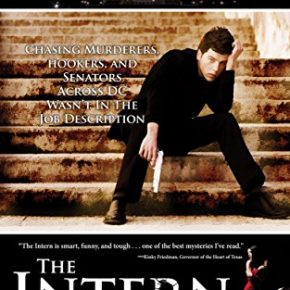The Intern: Chasing Murderers, Hookers, and Senators Across DC Wasn’t In The Job Description by Dale Wiley, published by Vesuvian Books, 2016.
The Intern is an entertaining novel, a novel that employs all the elements and devices we associate with its genre, the conspiracy-thriller. Trent Norris, the first-person narrator, main character is, just as the title suggests, an intern, an intern at the NEA, the National Endowment for the Arts, which he irreverently describes as “the artsy, standard-bearer of the Apocalypse, the dirty-minded, potty-mouthed, slightly fruity one. A lightning rod to the closed-minded and a place for lovers of the perverse.” But, of course, as an intern he is a minor player in the apocalypse, a gofer who files paperwork, sits in on meetings, ghost writes reports, and answers phones. In fact, it’s while covering the phone for the secretary to the chief financial officer that he gets indirectly involved with a conspiracy that involves the guy whose phone he’s answering and a couple of other chief financial types at foundations. He picks up the phone, a private-line he was not supposed to answer, and is told about something that was going to occur that afternoon. Later he realizes that the mysterious thing being discussed was the killing of a senator. His involvement comes about through the message he left, as a conscientious intern would, about the call; at the time, he thought that the vague thing being discussed was connected to an arts program. After that, a long and involved series of events take place. Trent ends up being chased by the conspirators and the police, who think that he was the assassin. In a matter of a few hours he goes from lowly unpaid intern to public-enemy number one.
Readers of this kind of fiction should be satisfied with the usual happenings – disguises, hiding in plain sight, car chases, break-ins, etc. Along with these thriller elements The Intern plays a bit with the idea of authorship. Trent Norris, an Emory University English major, is a self-conscious narrator. He wants to be a writer, as so many English majors do, and has a lot to say about writing and writers. He describes the serious novels of the day as “navel-gazing, novel-length display of purple prose, all about boring young people, repressed by their parents in boring places, who were now going home to make valuable new insights into their boring lives” – things he would most certainly not write. His nemesis, the financial guy at NEA, is a writer, a frustrated novelist, whose work and vanity about it play into Trent’s hand, so this aside about the state of “serious novels” does play a role in the plot. Along with his fiction, his nemesis writes poetry: “the kind of poetry that made you wish that rhyming and meter had never gone out of style, because he just dragged on about emptiness and blackness.” These pronouncements play out a little further when we get to the end and discover that what we are reading is Trent’s book about the things that happened to him – he also sells the movie rights and makes enough money to pay off some of the damage he caused proving his innocence.
In his Acknowledgements at the end of the book, the author, Dale Wiley discusses some of the history of the novel. It’s something that he had around in unpublished form for a while. “gathering electronic dust in my computer.” He then gives some of the background of its rise to publication – that section might be inspirational and/or helpful for some readers who may also face the daunting challenge of what to do with unpublished manuscripts. With that said, I should mention that the dated items in the story could have been updated – a novel can be revised. As I said earlier, The Intern is an entertaining book, a book worth reading, but it is not a polished novel. It seems derivative, a novel that could have been much better than it is. Perhaps, it wouldn’t have seemed that way if it had been published back when it was first written.

